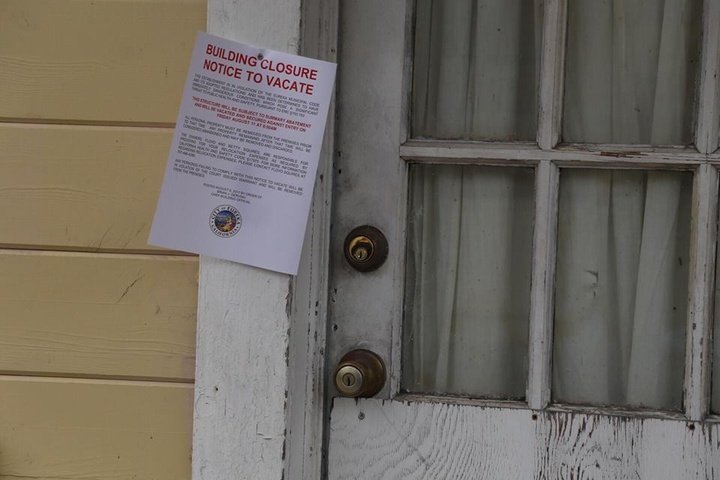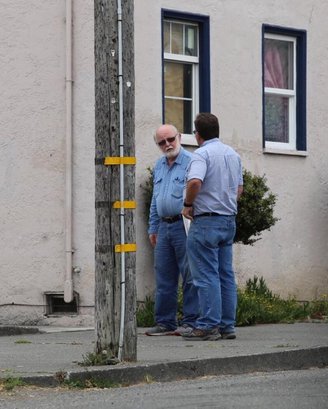
File photo of a “Notice to Vacate” flyer posted at a Squires-owned apartment building in 2017.
###

Floyd Squires outside one of the apartment buildings he owned in 2017.
Earlier this week, Humboldt County Superior Court Judge Kelly Neel dismissed the case of City of Eureka v. Floyd Squires, et al.
The dismissal, which comes almost exactly a decade after the city filed the suit against its most infamous landlord, was the result of a settlement agreement, with Eureka agreeing to cut its losses on a legal battle that had grown increasingly convoluted, mired in bankruptcy proceedings and prolonged receivership of many Squires-owned properties.
“It’s really unfortunate that it has taken this long,” Eureka Public Works Director Brian Gerving told the Outpost by phone on Thursday.
As a result of the agreement, a number of dilapidated residential properties have reverted back to Floyd and Betty Squires, including one on West Hawthorne that police raided earlier this week. But Gerving said the case did produce some positive results. More than a dozen of the 27 parcels listed in the suit have been sold to new owners.
“Some have been rehabilitated; some are in the process of being rehabilitated,” Gerving said, citing as an example the former Blue Heron Lodge property on Broadway, where a KFC has been built atop the ashes. (It’s set to open in the very near future.)
The city filed the suit on January 18, 2011, asking the court to appoint a receiver — that is, a neutral, court-appointed third party to take control of 27 parcels that city officials considered “nuisance properties.” Squires-owned rentals were already known for being squalid and hazardous, filled with black mold, firetraps and assorted building code violations.
Two years after the case was filed, the court appointed former Humboldt County Planning Commissioner Jeff Smith as receiver for the nuisance properties. But the Squirses failed to bring their assorted properties up to code and the court cased dragged on and on.
In 2017, Eureka went on the offensive, filing a motion to expand receivership powers (or else replace Smith in the role) and, a few months later, obtaining inspection warrants for close to a dozen Squires properties. As a result, a number of the residential buildings were condemned and demolished.
The Squireses threw a wrench in the works that same year by filing for bankruptcy, tying the properties up in another layer of litigation and stymying the city’s attempts to coerce compliance with its municipal codes.
A weary tone can be inferred in the settlement agreement. (Click here for the pdf.) “This Agreement is intended to avoid additional litigation and hardship for the parties and the community,” it reads.
As a result of the Squirses bankruptcy proceedings, the remaining nuisance properties addressed in the suit were placed under the control of a “liquidating agent,” Gerving said. This court-appointed officer has been managing the finances of the estate and the properties it’s comprised of. Those that have reverted back to the Squirses were abandoned by the agent, presumably because owning them was a financial liability.
“I would say it’s not a coincidence that the properties that were abandoned by the bankruptcy estate are also those in the worst condition,” Gerving said.
While the agreement includes a release of liability — a fresh slate on the parcels in question — it doesn’t preclude future crackdowns. “The City expressly reserves its rights to take enforcement actions related to violations on the Nuisance Properties,” the document states.
Gerving said his department remains vigilant. “We’re continuing to pay attention to these problems and we will address them as appropriate,” he said.
And so, the city’s battle with Floyd and Betty Squires is bound to continue, though the couple has fewer properties under their control than they did a decade ago.
###
PREVIOUSLY
- Eureka Cracks Down on Notorious Slumlords, Vows to Close Squires’ Motel
- Blue Heron Residents Evicted As City Enforces Abatement Order
- Fire on Fifth Street, One Victim Burned
- Eureka Police Search Squires-Owned Apartment, Find Lots of Heroin
- Another Heroin Bust at Squires-Owned Apartment in Eureka
- (UPDATED) Major Middle of the Night Fire in Vacant Building Near Downtown Eureka
- Another Fire at Vacant Squires’ House on Eureka’s H Street
- (UPDATED) Yet Another Fire Erupts in Yet Another Floyd Squires-Owned Building
- Neighbors of Squires-Owned Building Win Insurance Settlement Over Nuisance Property
- Eureka Takes More Legal Action Against Slumlord Floyd Squires
- Tenants Evicted as Officers Board Yet Another Squires Property, Eureka Foots the Bill
- Neighbors Unload on ‘Evil Slumlords’ Floyd and Betty Squires in Closing Arguments of Small Claims Case
- Officially a ‘Nuisance’: Judge Rules For Neighbors in Mass Small Claims Suit Against Squires Family
- For Second Time in Two Weeks, EPD’s POP Unit Busts 65-Year-Old Suspected of Dealing Drugs to Homeless Out of Squires-Owned ‘Heroin Hilton’
- Notorious Landlords Floyd and Betty Squires Challenge Small Claims Ruling, Promptly Get Denied
- (PHOTOS) Armed With Warrants, EPD and City of Eureka Inspect 11 Squires-Owned Shitholes
- (UPDATES) Former Blue Heron Motel Office Building in Flames
- (VIDEO) RIP, Blue Heron Motel! Troublesome Squires-Owned Building Demolished by Eureka
- (PHOTOS) Playing Hardball, Eureka Demolishes Another Squires-Owned Building
- (UPDATE) City of Eureka Says: Blue Heron Burned Because Squires Didn’t Pay Prostitute For Oral Sex Received
- Hearing for Accused Blue Heron Arsonist Postponed; Eyewitness Sought; Squires Present in Court
- Blue Heron Arson Trial Proceeds; Second Person Seen Fleeing Scene May Also Be Charged
- Squires Property on Third Street Condemned by the City of Eureka; Tenants to Receive Relocation Funding
- Squires Property on Third Street Condemned by the City of Eureka; Tenants to Receive Relocation Funding
- City of Eureka to Vacate, Board Up Yet Another Squires Property, Citing a ‘Continuous and Flagrant Disregard’ for State Law and Tenant Safety
- Eureka Increases Amount Being Given to Squires Evictees as They Scramble to Find New Housing
- (VIDEO/PHOTOS) Eureka Police Serve Search Warrant, Detain 14 People at Squires-Owned Nuisance Property
CLICK TO MANAGE